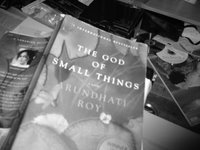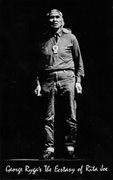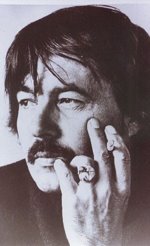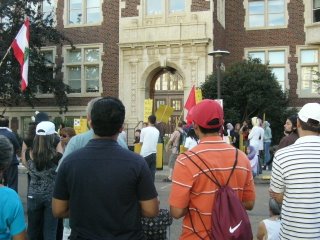Tuesday, July 25, 2006
Which way ahead
I've never gotten an email from the Red Cross before today. There's probably a good reason I'm on one of their mailing lists, but until this morning I had never received any messages from them asking me to donate, not for Darfur, not for Java, not for Aceh. It probably says something, then, about the magnitude of the humanitarian crisis in Lebanon right now that they are appealing so directly for help aiding civilians.
This Saturday I saw a group of protesters gathered outside Corbett Hall at the University of Alberta pleading for an end to the bloody conflict, which has claimed hundreds of Lebanese and Israeli lives and displaced an estimated 750 000 people in Lebanon. This isn't the first protest of this kind in Edmonton since the rockets started firing two weeks ago; earlier, about 500 people gathered in front of the Legislature to demand a ceasefire. These are not just Canadians with family in Lebanon (and some from Edmonton have already lost family members), and these are not just a group of eccentrics and anti-Israeli protesters. It takes a lot to get people in Edmonton out on the streets, and a lot of people from all backgrounds here just want the violence to end.
BBC has reported accusations of Israeli soldiers using Palestinian civilians as human shields during incursions in Gaza, Human Rights Watch has published a report condemning the use of cluster bombs in Israeli army attacks in Lebanon, and the United Nations has warned both Hezbollah and Israel may be guilty of war crimes for using excessive or indiscriminate force as the humanitarian crisis in the region mounts. On her recent visit to Beirut, US Secretary of State Condoleeza Rice showed only the faintest interest in supporting an end to the bloodshed in the region before Israel has unilaterally accomplished its goals, however grave the cost.
There has been a lot of talk about UN Security Council Declaration 1559, which called for the disbanding disarmament of all Lebanese and non-Lebanese militias in the region, as well as the withdrawal of foreign troops (which Syria reluctantly followed through on last year after an upswelling of public pressure in Lebanon following the assassination of former Prime Minister Rafik Hariri). Since Syria's withdrawal, not much has been done in following through with the rest of the resolution, a situation which has made Israel understandably nervous, since Hezbollah had been lining up rockets along the border well in advance of the kidnappings that were the immediate provocation for the escalating war there now. So the Israeli government has been arguing that since no one else has stepped in to enforce Resolution 1559, it must do so itself, by any means necessary. Well, I wonder if Stephen Harper would use the word 'measured' to describe other violent unilateral enforcements of UN Resolutions, like, say, the ones condemning the construction of the barrier through the West Bank.
This is not how peace goes forward.
Wednesday, July 19, 2006
And how, and how much
 NOBODY'S TALKING ABOUT GILAD SHALIT anymore. I think it's clear by now that the escalating violence in Israel, Gaza, and Lebanon has to with a lot more than kidnapped soldiers. I am certain I was not alone in my shock at Hamas' election within the Palestinian authority earlier this year; my only impression of them had been as a militant group, not as a political force. Perhaps I should not have been so surprised, since Hezbollah itself made a similar move in Lebanon not so long ago.
NOBODY'S TALKING ABOUT GILAD SHALIT anymore. I think it's clear by now that the escalating violence in Israel, Gaza, and Lebanon has to with a lot more than kidnapped soldiers. I am certain I was not alone in my shock at Hamas' election within the Palestinian authority earlier this year; my only impression of them had been as a militant group, not as a political force. Perhaps I should not have been so surprised, since Hezbollah itself made a similar move in Lebanon not so long ago.Stephen Harper's comments about Israel's response to the kidnappings, first of soldier Gilad Shalit in the Gaza strip and then of two soldiers into southern Lebanon a week ago, are, I think, rather insensitive. What man in his right mind could tell the families of the hundreds of Lebanese civilians killed in the last week that Israel's response to the crisis has been 'measured'? What about the millions in Lebanon and Gaza beng left with rapidly diminishing supplies of food and water, shelled-out roads and homes, no electricity, and no route by land, air, or sea, to reach safety? Would they agree with such a characterisation? Hezbollah's missiles are reaching further south into Israel than ever before, and dozens of Israelis have been killed or wounded in what the Israeli governement has already called a war. Don't they too have a vested interest in resolving the conflict peacefully, especially with speculation of the violence widening to neighbouring Syria? Or are other interests, such as destabilising Hezbollah and Hamas, worth the quickly rising cost of human life?
In her 1997 novel The God of Small Things, Arundhati Roy writes about history's hands, the hold they have on us. The book, set mainly in Kerala, India, tells the story of two twins, Estha and Rahel, caught between these fingers, about lives shaped by loss, and about the walls we construct between each other to draw a line and say, Here, this is where the extent of my love ends. It is with this in mind that I'd like to talk about another violence going on in Israel and the Occupied Palestinian Territories, one with perhaps even deeper dimensions than the airstrikes and shelling being hurled across borders in the region now. For some barriers are more devastating, more damaging, than even bullets can be.
It is probably impossible to divorce Arundhati Roy's work and life from her writing. Although The God of Small Things was extremely well-received upon publication, she has not written another novel since; instead, she has focussed on a number of non-fiction books relating to a number of political issues in India that she has been involved in, including the Narmada dam project and India's nuclear policies. Her writing has been compared to Salman Rushdie's in a number of respects--indeed, there are a good deal of similarities in their use of language and casual explanation/exploration of seemingly tragic events. The 'Midnight's Grandchild' epithet that has sometimes been attached to her is probably too narrow to describe Roy's elegant manipulation of voices and quiet sense of a moment's beauty and tragedy. The best parallel to draw between the authors is their passionate use of story-telling to uncover what's invisible, to refuse to allow ideas to go unspoken, to 'name the unnameable, to point at frauds, to take sides, start arguments, shape the world and stop it from going to sleep,' as it were.
 The book is told from the perspective of Estha and Rahel, children on the brink of becoming themselves, mostly as the story of a series of events and arrivals in 1969. Occasionally, we are brought back closer to the present, meeting the twins at an older age, and see them in a family torn apart like crumbling driftwood and framed in loss by something that happened that summer. Roy has a talent for giving the impression, throughout the novel, that the ending is contained in the beginning, that you already know how it will end; this does not diminish, however, her sharp tendency to elicit anguish in the midst of otherwise simple, dewdrop moments. There is an unspoken sense of a violence and intolerance lingering under some parts of the book that is most obvious when no one will acknowledge it. This is most clearly evident in the twins' fascinated horror at the brutal beating of a character who would otherwise be, at best, completely unremarkable to most of the Touchables in the town:
The book is told from the perspective of Estha and Rahel, children on the brink of becoming themselves, mostly as the story of a series of events and arrivals in 1969. Occasionally, we are brought back closer to the present, meeting the twins at an older age, and see them in a family torn apart like crumbling driftwood and framed in loss by something that happened that summer. Roy has a talent for giving the impression, throughout the novel, that the ending is contained in the beginning, that you already know how it will end; this does not diminish, however, her sharp tendency to elicit anguish in the midst of otherwise simple, dewdrop moments. There is an unspoken sense of a violence and intolerance lingering under some parts of the book that is most obvious when no one will acknowledge it. This is most clearly evident in the twins' fascinated horror at the brutal beating of a character who would otherwise be, at best, completely unremarkable to most of the Touchables in the town:'Blue-lipped and dinner-plate-eyed, they watched, mesmerized by something that they sensed but didn't understand: the absence of caprice in what the [attackers] did. The abyss where anger should have been. The sober, steady brutality, the economy of it all.'In the book Against the Wall, a collection of essays about the separation barrier by writers from Israel, Palestine, and around the world, Ariella Azoulay and Adi Ophir argue that the strategy being pursued by Israel with regards to the Palestinians is one of continuously exercising violence in the hopes of supressing it; not unrelated to the the attitude that, as Haifa University professor Steven Plaut wrote, 'no terrorist has ever murdered anyone else after being executed.' The belief in what Azoulay and Ophir call 'Violence that prevents violence' assumes that peace is impossible, a continuous renewal of a never-diminishing source of violence is inevitable, and it must be suppressed on a never-ending basis by whatever means possible.
The separation barrier itself, then, is seen as the most effective means of protecting Israeli citizens from attacks by Palestinian militants; it is disruptive, penetrable only on Israel's terms, and an extremely efficient method of communicating a very definitive message. It is a continuous disruption, a barrier being built with no intention of ever being dismantled, as a means of innoculating one population from physical violence by the other. And because it is being built on the terms of what Israel sees as its own security needs, its construction is backed by the seizure of Palestinian farmland, villages, and fields that are deemed necessary to protect the Israeli settlements in the West Bank and the ordinary cities and towns on the other side of the UN-backed Green Line border set down in 1967. The material environment in the whole region is being reimagined, with a heavy cost, in the interests of collective safety, and redefining human relationships with an ever heavier toll.
What Estha and Rahel witness in the casual, internalised brutality of that beating is similar; both depend on the belief that mutual understanding and cooperation is impossible, and the animosity is so entrenched in the relationship that it almost goes unnoticed, unseen, noticeable only in its absence; this is simply the way things are, and the only way they can ever be.
Ah, I drift.
If you recall a picture I posted here a few weeks ago of a head with its hands clasped, titled 'The Laws,' I'd like to explain what was behind it. That week was the anniversary of the discovery of HIV/AIDS, and 25 years later, stigma is still extremely strong around those people living with HIV around the world. This is what Roy refers to in The God of Small Things as The Laws of who should be loved, and how, and how much. We draw barriers between each other out of fear, out of anger, out of a lack of understanding, mostly, without realising how very much in common we have. In the novel, these barriers are the background to a loss that hollows out the twins' lives, that of their Ammu, their uncle Chacko, their aunt Baby Kochamma, and all of those around them. Their lives are framed by this absense, this emptiness, and its root is a series of events the book seems to lead inexorably towards, because the characters draw lines between each other, or have them drawn by history, to define what kind of love is allowed between them, if any, and what must happen if those rules are broken.
This wall, that not only divides Israelis and Palestinians, but also Palestinian families and friends from each other in its many incursions behind the Green Line, says that our collective imaginations have been exhausted, that there are no options beyond total separation, at any cost. Estha and Rahel have their futures redrawn for them in dark smudges of grief because the rules of love, its barriers, are broken. I know it sounds vague, but trust me, when you open this book you will be saturated by the ripples of this simple tragedy emanating through their lives. It's been called an apatheid wall, and in a sense, that's exactly what it is: the construction of a division between one group and the Other, which in turn fuels the conflict between them and exacerbates feelings of irreconcilable differences and mutual identification as Others.
My friends, there must be other options. I really believe there must be a way out of this lack of imagination. Perhaps, perhaps rockets will continue to be fired as long as grievances remain. I admit, there is so much that I don't understand about the conflicts in the Middle East. History tells so many of our stories for us before we've even arrived at them.
I'd like to share just one more moment from The God of Small Things; in this chapter, Rahel, a woman now, has sleeplessly wandered to a nearby temple in the night to witness Kathakali dancers buying back their dignity, as it were, by dancing for the gods at night after selling a cheap version of the divinity of their dances to languid tourists by day. Arundhati Roy has such a way of drawing you into her moments, about who we are. I hope the storytellers in Israel and Lebanon and Gaza find a peaceful way to resolve this conflict, to tell this story.
Anyway.
Rahel sat down cross-legged, resting her back against the roundness of a white pillar. A tall cannister of coconut oil gleamed in the flickering light of the brass lamp. The oil replenished the light. The light lit the tin.How does this story end?
It didn't matter that the story had begun, because Kathakali discovered long ago that the secret of the Great Stories is that they have no secrets. The Great Stories are the ones you have heard and want to hear again.The ones you can enter anywhere and inhabit comfortably. They don't deceive you with thrills and trick endings. They don't surprise you with the unforseen. They are as familiar as the house you live in. Or the smell of your lover's skin. You know how they end, yet you listen as though you don't. In the way that although you know that one day you will die, you live as though you won't. In the Great Stories you know who lives, who dies, who finds love, who doesn't. And yet you want to know again. That is their mystery and their magic.
Sunday, July 16, 2006
Oh, of course
Depending on how long the munificence of CanWest Global's servers lasts, the article is available here.
Mergers and missiles
 I wanted to write about what's going on in Israel and Lebanon and the Gaza Strip right now, but I have been quieted by the sheer pace of the violence. It seems I am more naïve than I realised, because I have really been stunned by how quickly the situation has escalated. Possibly more on that later.
I wanted to write about what's going on in Israel and Lebanon and the Gaza Strip right now, but I have been quieted by the sheer pace of the violence. It seems I am more naïve than I realised, because I have really been stunned by how quickly the situation has escalated. Possibly more on that later.I am, however, perhaps predictably concerned about Bell Globemedia's overtures toward CHUM. Edmonton has three main daily news broadcasts, CFRN News (owned by BGM), Global (owned by CanWest Global), and CityTV (owned by CHUM). Global used to be called ITV, and was an independent station established and owned in Edmonton; CityTV was called A-Channel, and was relatively independent until it was bought out by CHUM a few years ago and they added that Much More Music driftwood guy to the morning show, Bill Welychka.
So the already small number of media outlets with a news broadcast in Edmonton, if the merger goes through, will be basically divided between a company owned by the Aspers and a company owned by the Thompsons. The unique spin on this story in The Globe and Mail (BGM's -ahem- national newspaper) is worth mentioning; rather than portray the merger as one giant company trying to get an even bigger share of the market to run down their competitors by folding in another relatively large and willing partner, they published a front page article about purported tensions between the adult children of CHUM founder Allan Waters, who passed away last December. I was intrigued by how cleverly The Globe told the story as one of desperate sibling drama reaching a seemingly inevitable breaking point and forcing them to sell. I'm not biting, but then, I'm not in charge of the CRTC.
It's now up to the independent broadcasting watchdog, which regulates Canadian media from radio to satellite TV, to decide whether to allow BGM, which already controls CTV, the Discovery Channel, the Comedy Network, and has 15% shares in the Toronto Raptors, among other things, to take control of CHUM's newsrooms from Vancouver to Winnipeg, its muzak division, its sprawling radio network, and, of course, MuchMusic. Any sane and rational person might point out that the media in Canada is already incredibly concentrated, and perhaps even take the bold move of arguing that allowing Bell Globemedia to have such a huge slice of the pie might be bad for say, people wanting to get a balanced set of perspectives from their nightly news, let alone the hundreds of people fired by CHUM hours before the merger was announced.
The BGM management's triumphant announcement that this will create a 'national champion in broadcasting' seems disingenuous at best. I've heard people saying the CBC's rather negative coverage of the merger from its Arts division is overly harsh, that it's a bit rich for them to be arguing there won't be enough variety of opinion in the Canadian media if it goes through. But who can honestly say they would rather have fewer newsrooms operating in our country, fewer journalists, fewer talented hosts on sports radio? Perhaps it's wishful thinking to assume I'm not alone here. Anybody?
Photo credit: Dan Barham
Monday, July 10, 2006
Infinite attempts
ATTENTION! Friends who speak the language of the machines. Please help. Do you know how to change a colour that is named c44393jsja; or jGUNTER7999? Help, people of the machines.
101010110101, etc.
Edit: Never fear, I have learned enough of this rough foreign tongue to communicate with the savages.
Sunday, July 09, 2006
A host of things
 THERE'S MORE ABOUT TURTLES THAT I DON'T KNOW THAN YOU'D probably think.
THERE'S MORE ABOUT TURTLES THAT I DON'T KNOW THAN YOU'D probably think."The truth about stories," says Tom King, "is that's all we are." There are so many stories, so many histories we tell and are woven from. I had a chance to sit down with my friend the other day for the first time in, well, too long, and talk about what storytelling should be all about. What's more important? The message, or the entertainment? How do you do enrapture the listener, plant that hook, and reel them in?
I suppose I should begin by saying that this week's book is actually a play, one I didn't know much about until recently and am still learning more about, and given that the issues I think it speaks to are also much greater than my understanding of them, I'd like to point out that there are a great host of things about which I simply don't know enough to speak with any authority to, and this is one of them. The standoff at Caledonia between Six Nations band members, OPP officers, Caledonia residents, and developers which came to a head a few months ago is not new news by any stretch of the imagination, but luckily I don't run on a 24-hour news cycle, so I can write about what I'm curious about and think should get a chance to be heard.
This is also a good chance to somewhat explain the concept behind this site. Last year, my friend asked me to come up with a way to sort of summarise things going on in our community and around the world for him; a sort of Newsnet Lite. I quickly discovered that I am exceedingly poor at doing just that. I can't summarise if my life depends on it, and as may be evident, I like to talk for a long time about things.
I am, however, pretty devoted to reading, and I was curious to see if I could find a way to tell him about what I was reading in light of things happening on this planet we call home. More often than not, though, what I'm reading is wrapped up in social and cultural and political contexts I don't have the whole picture about, so I end up doing a little bit of a background to place it squarely amidst the rushing currents of time and so on, etc. This is the process I have pried open here, and this is the process I am still going through with a play called The Ecstasy of Rita Joe, by Canadian playwright George Ryga.
When Rita Joe was first produced in 1967, Canadian theatre in Canadian theatres was, fittingly, slim; a successful, talked-about play dealing with aboriginals, well... I was born about two decades later, but it's still incredible to me. When the Vancouver Playhouse put Ryga's piece up on stage, they must have had some inkling of what a groundbreaking, and necessary, play it was. The story follows the journey of the eponymous young Rita Joe, a woman adrift in a city, caught between it and the reserve she comes from, and volleyed around from government program to social net to court again and again. It is not your average piece of theatre, even for a contemporary audience. And director George Bloomfield must have felt something of this when he cast Chief Dan George as Rita's father, in a part nearly written for him, the man captured so iconically in the image on the Talonbooks edition's cover.
I've only recently become familiar with Chief Dan George, but the role certainly demands a certain natural weight from the actor. Rita's father, David Joe, is a patient, if conflicted, man. His wisdom seems to come not from any need to trumpet hard-earned credentials or show signs of his greatness, but from a well of strength that lets him bear the loss of his daughter to other possibilities and a desire to rise above anger and disappointment. Rita's lover, Jaimie Paul, walks with him in one scene on the reserve (possibly a dream of Rita's), and shouts his frustration at the futures closing down before him:
"No more handouts, David Joe... We can pick an' can the berries ourselves."Rita's father refuses to let the frustrations of the possible futures set out for them conquer him. But throughout the play, there is a recurring theme of characters trying to battle a system set out ostensibly for their benefit, but more often than not, presenting barrier after barrier to them. The play is mainly told through Rita's trial before a magistrate (not for the first time) on charges of prostitution, and her visions of past and future events. Dark figures cling to the shadows of the stage, and as the judge demands again and again she bring forth witnesses to testify to her character, she is visited by the spectres of Jaimie Paul and her father and her sister.
"We need money to start a cooperative like that," Rita's father replies.
"Then some other way!"
The next stage direction reads, "The old man listens, standing still, to the sounds of the train and night." "You're a young man, Jaimie Paul," he says. "young an' angry. It's not good to be that angry."
"We're gonna work an' live like people... Not be afraid all the time... Stop listening to an old priest an' Indian department guys who're working for a pension!," Jaimie Paul roars back.
"You're young man, Jaimie Paul..."
"I say stop listening, David Joe! ... In the city they never learned my name. It was 'Hey, fella'... or 'You, boy'... That kind of stuff."
There's a pause, and then the sound of a train whistle.
"A beautiful night, Jaimie Paul."
Jaime Paul seems in untenable conflict with authority figures of "mainstream" society throughout the play, perhaps less by any innate combativeness than by an incompatible conflict of stories. The one he wants to believe, the one his people tell and lived their lives through, does not seem to be able to survive along the rushing onslaught of the government's own story. Defiant before a judge himself at one point, he yells, "Give me back my truth!" You see, what Tom King means when he says all we are is our stories, is that we live out our own myths, and by myths I don't mean false legends. The creation stories we hold true, the stories about our histories, the stories of what's good and what's evil, are lived out in our lives every day, and they define us in profound ways. Well, that's what Tom King says. But I think he's onto something.
A Six Nations leader (whose name escapes me) being interviewed by CTV a few months ago at the Caledonia blockade said he wanted the media to stop referring to the organisers as "protesters." Instead, he said, they should simply be referred to as Six Nations people, and when asked how long they intended to stick out the dispute, he said his people had been on the land for centuries, and they weren't going anywhere anytime soon. It's a comment that highlights the divisive conflict that came to public attention this year over land near Hamilton that Six Nations people claim was granted to them by the Crown in 1784, and that developer Henco Industries Ltd, which has begun construction there on a new subdivision, claims was ceded to the government in 1841, and later sold to them.
The Globe and Mail's Murrary Campbell quite rightly pointed out in April that there is a question here, when critics of those protesting say that "the rule of law must prevail," of whose law we're talking about. When Six Nations members announced on February 28 that they would begin occupying the land Henco has sketched out for the Douglas Creek Estates development, a conflict was physically manifested between what Campbell calls "the law of the conquering race that apportions land and offers clear deeds of ownership... [and]the law of the natives who sanctify the land--the back of the great turtle--and do not believe it should be commercialized."
 Two different stories, two different ways of life. What to do?
Two different stories, two different ways of life. What to do?Ryga, a Ukrainian-Canadian writer from Northern Alberta, seems to say in The Ecstasy of Rita Joe that every attempt at benevolence from the... well, the white society, is destined to compound the oppression of Rita and others like her. Adrift in the city, called to summon character witnesses she cannot, she is condemned over and over and over in every act of "goodness" tried by her teachers, her priest, the workers at the soup kitchen... Even in its time it was criticised for being overly blunt and wide in its condemnation of what comes off as systematic oppression. But there is something that rings true in Rita's bitter query when her old school teacher's impressions of her behaviour as a child come back to haunt her: "One letter... one letter for a lifetime?"
When the UN Human Rights Council almost unanimously passed a declaration last month which called for an expansion of indigenous rights worldwide, only two countries refused to endorse the document, which has been in the works for decades; Canada and Russia. Australian network ABC News reported that, "Australia is not a member of the council but Canada says it was representing the interests of Australia, American and New Zealand." Unsurprisingly, all are nations with significant aboriginal populations, and the latter three recently put out a joint statement "reject[ing] the assertion that aboriginal people have the right to 'self determination, saying it was inconsistent with international law."
Officially, the government's position has been that it wants another two years of negotiations over the wording of the declaration. There are sections in the non-binding document, which goes to the UN General Assembly for approval in September, which Indian Affairs minister Jim Prentice has argued are not in line with the Canadian government's position on aboriginal rights to land claims and self-determination. Prentice also hinted at the Conservatives' umbrage with sections that might complicate future oil and mineral agreements with First Nations groups.
After months of tension between Caledonia residents and Six Nations members, between those blockading the main road through town and Ontario Provincial Police officers, the Ontario government agreed in late June to pay $12.3 million to Henco Industries to buy the land and put it in trust until the land dispute is resolved. Opposition leader Jim Tory has criticized the move, saying it will set a dangerous precedent for future land claim negotiations; Six Nations members continue to occupy the land.
The presence of the OPP has made the standoff regrettably reminiscent of the Ipperwash incident of 1995, where OPP officers involved in a similar dispute shot and killed one member of a group occupying Ipperwash Park, Dudley George, allegedly at the behest of provincial government officials. Fortunately, this time, peaceful negotiations commenced, with mediators present, at an early stage. Some Ontario politicians have even accused the McGuinty government of not getting involved enough in diffusing the crisis. So many questions.
It all makes me wonder what exactly we were celebrating last Saturday, when those three young men in Ottawa, evidently brimming with their own comic genius, saw fit to urinate on the War Memorial. What does it mean to celebrate the founding and development of a country whose history is so many times fundamentally at odds with the people who have inhabited this land since millenia before Pierre Trudeau was a twinkle in his mother's eye? Perhaps you see why I say I don't know enough to speak with any authority to these issues; with so many layers, so many stories, there is a lot to take in.
Who does the land belong to? Does it belong to any of us? At any rate, we won't find the answers until we really understand each others' stories. I wish I could have seen Chief Dan George on stage back in 1967, especially in the scene where Rita's father comes to the city to take her back home. The journey has exhausted him, and she is torn between staying with Jaimie Paul or returning to the only real home she knows, but where she feels there is nothing left for her. "I live... an' I'm afraid. Because... I have not done everything. When I have done everything... know that my children are safe... then... it will be alright," he says. Turning away from both of them, he muses, "For a long time... a very long time... she was in my hands... like that!" He cups his hands together into a bowl. "Sweet... tiny... lovin' all the time and wanting love..."
His is a dignity and a love I would have been honoured to witness.
Note: This entry should have appeared Wednesday, 5 July 2006.
Labels: aboriginal stuff, books

This work is licensed under a Creative Commons Attribution-Noncommercial-Share Alike 3.0 Unported License.


